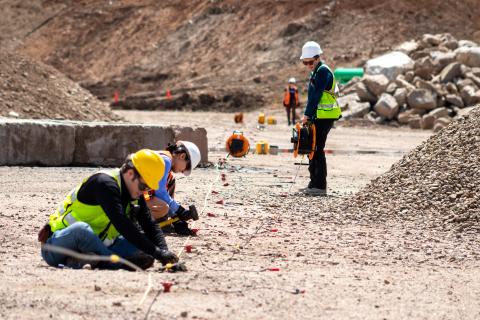All Categories
Featured
Table of Contents
Geophysical Survey Methods in Nollamara Western Australia 2023
Connect with MBA programs seeking prospects like you. Study. Link with master's programs around the country to get an edge over the competitors.

A geophysicist research studies numerous aspects of the earth. According to the U.S. Geological Study, they study gravity, magnetic, electrical, and seismic activity events. Geophysicists likewise record, examine, and take measurements of geographical features and abnormalities. Enjoy a video to learn what a geophysicist: Geophysicists must earn a minimum of a bachelor's degree; however, this is for an entry-level position.
Advanced degrees require more specific research studies in the specialty of option. Task potential customers are greater if you have a strong background in computer science or innovation.
Geophysical Surveys - U.s. Geological Survey in Duncraig Western Australia 2022
Access to these chances might be limited depending upon where you live; nevertheless, internships or summer season programs with geophysical companies, university geophysics department, or the U.S. Geological Study can be options. You can find a list of a list of chances on the United States Geological Study (USGS) sites' Pathway Programs tab (opens in another link).
Geophysicists likewise work with computer systems while looking into, so computer system courses can also be useful, as discussed earlier in this post. Numerous geophysicists specialize in an area of geophysics.
A geophysicist's duties can consist of measuring, tracking, and documenting data from various physical homes in the world. They likewise assess and examination details received. Geophysicists typically have to take a trip worldwide to analyze geological events that have actually occurred or might have been predicted. Geophysics is a research-based career field, therefore one should have the ability to assume, problem-solve, and concern or obstacle previously held presumptions from their collected information.
Geophysicist in Shoalwater Oz 2021
Jay Wellik, a geophysicist, research studies volcanos. Geophysicists generally work full-time hours; nevertheless, they frequently work irregular hours, as mentioned previously.

You can discover additional details about Geophysicists in addition to additional educational materials on the U.S. Geological Study website (links open in a new window). Laura Stern, of the U.S. Geological Study at the Gas Hydrates Lab in Menlo Park, California: We make a variety of various hydrates in the laboratory.
We also make carbon dioxide hydrate, ethane hydrate, propane, a number of different structures. It's about 100 degrees chillier than the temperature at which these hydrate samples would dissociate, when they would decompose to ice plus gas on the tabletop.
Geophysical Prospecting in Noranda Australia 2022
They look like snow, it looks like compressed snow but truthfully, it does consist of gas inside. It's going back to ice plus gas and then as the ice would melt as it continues to warm, it will end up being water plus gas.
My name is Steve Kirby, I'm a Geophysicist here at the U.S. Geological Survey in Menlo Park. I work with Laura Stern who is likewise a Geophysicist in this laboratory that is dedicated towards the examination of planetary ices and gas hydrates. Gas hydrates in nature occur in really remote locations and they are very complicated with the interactions and conditions that they form under and samples that are brought up are under some sort of alternation or decomposition.
This is an unusual laboratory and there are just a handful of them worldwide and we are very lucky to be here at the Geological Survey and to have the chance of working on them. Bureau of Labor Statistics, U.S. Department of Labor, Occupational Outlook Handbook, Geoscientists. National Center for O * Internet Development.
Consumer Guide To Geological And Geophysical Services ... in Bull Creek Oz 2020
00. O * NET On, Line. This video was produced by the government for the U.S. Geological Study. The USGS Gas Hydrates Lab is moneyed by the Department of Energy and the USGS Gas Hydrates Project.
Latest Posts
Geoscientist - College Of Science in St James Aus 2021
What Is A Seismic Survey? in Straffon Oz 2021
What Are Geological, Geochemical, in Hovea WA 2022